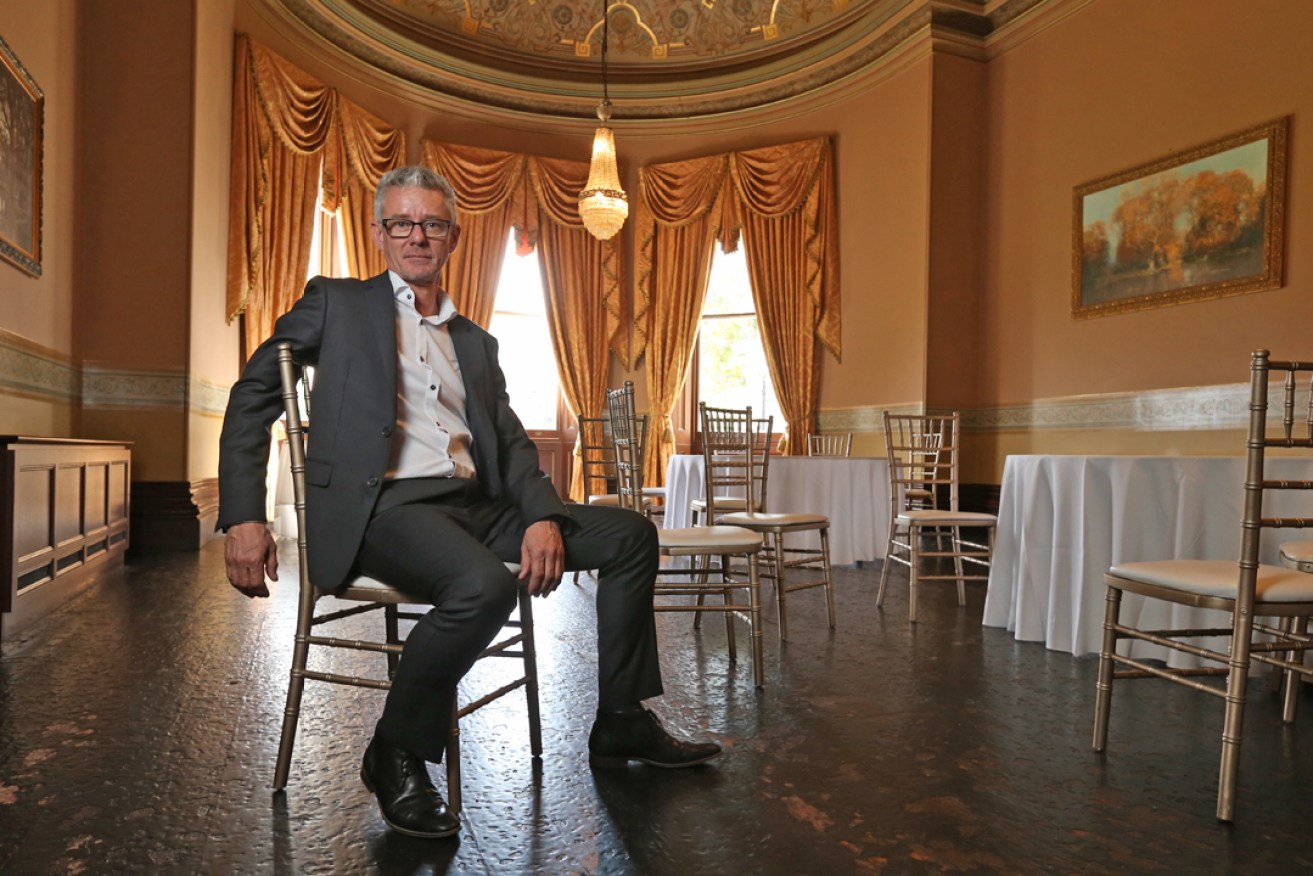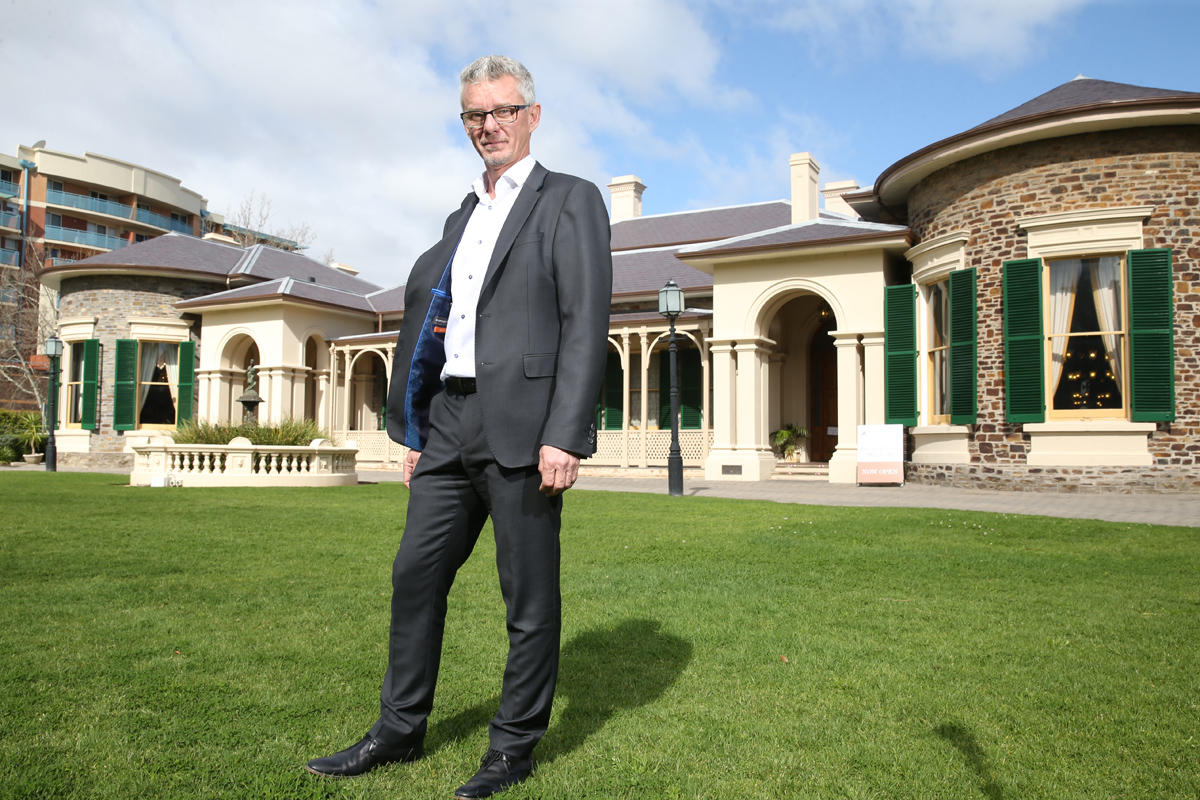McLeod’s silver lining
Ayers House managing director Richard McLeod is no stranger to tough economic times after cutting his teeth as a hospitality industry insolvency consultant during the 1990 recession. Following almost 30 years at the helm of one of the city’s favourite historic event spaces, McLeod is looking to reboot his consultancy career to help struggling hospitality businesses reset on the other side of the COVID-19 shutdown.


Ayers House managing director Richard McLeod in the historic building's ballroom, which is used for weddings, corporate events and parties.
McLeod was in his mid-20s and working as a restaurant manager at the Lakes Resort at West Lakes in 1987 when the business went into receivership and he was thrust into the role of food and beverage manager.
That experience and the looming recession encouraged him to set up his own consultancy business in 1988 to work with insolvency practitioners to provide hands-on advice for licensed premises.
McLeod soon had worked with more than 20 hospitality businesses that had hit hard times, including the Hackney and Arkaba hotels and Ayers House.
“They were able to reset 30 years ago and go on their merry path and the receivers were able to get a sale,” McLeod recalls.
He approached insolvency practitioners and told them to call if they had a receivership and needed someone to come in and find the issues and see how to correct it.
“Some businesses weren’t so lucky and had to shut but it was rare that we shut anything, most were sold as a going concern, which was the ultimate aim,” McLeod says.
In 1990 McLeod was engaged as a consultant at Ayers House, the last remaining of North Terrace’s grand mansions. It was the residence of five times Premier of South Australia and wealthy industrialist Sir Henry Ayers from 1855 until 1897 but had been a hospitality venue since 1970s and was a favourite business lunch spot and silver service restaurant.
However, the Hawke government’s introduction of the Fringe benefit Tax in 1986, which was payable on restaurant meals, spelt the end of tax deductable lunches and McLeod says this along with Ayers House’s model of running a silver service restaurant and a buffet restaurant seven days for lunch and dinner led to its demise.
“They kept on trying to be an ‘80s restaurant when we were moving into the ‘90s and it wasn’t working.
“The silver service was old school, elitist and very expensive to produce so we turned the silver service into a night-time restaurant, the buffet into a day-time restaurant and limited the days they operated and just marketed functions and events.”
But McLeod could see the potential and after consulting for a year he bought the place.
“By the time we bought the business a year later it was actually profitable.”
Ayers House now focuses on events and hosts 300-400 hundred corporate and social celebrations a year including about 100-150 weddings.
“When we first came into the property in 1990 there were about $30,000 of forward bookings, by the time we bought it a year later there were more than $700,000 in forward bookings,” McLeod says.
“We used very simple marketing as well where we literally went through the engagement notices in The Advertiser, matched names with addresses out of the White Pages and sent them a letter.
“Sometimes we were showing up to a dozen couples through the place on a Saturday, it was just amazing and it just appealed to people.
“Then we started opening up for Christmas events as well and started putting marquees on the front lawns, which gave us capacity and so all of a sudden everyone in South Australia could come to Ayers House – we were appealing to a million people as opposed to a set of people from Beaumont.”

Richard McLeod is approaching 30 years at the helm of the Ayres House hospitality business.
During peak times Ayres House employs up to 90 staff but usually has about 30 on its books at this time of year and has managed to retain 16 staff during the shutdown through JobKeeper payments. The state government has also waived rent for six months.
Aside from a few small events in July and August, Ayers House will not re-open in earnest until September, which McLeod says will give the business a chance to hit the ground running.
He says while a number of corporate bookings had cancelled, almost all of the weddings over the shutdown period had moved to available dates later in the year or next year.
“The biggest challenge with the lockdown was that 95 per cent of our clients postponed, they didn’t cancel, and then moved their event into the last quarter of this year and into next year,” he says.
“But that means that people have had to move to Fridays and Sundays as well so we’re really doing 2020 weddings and events in 2021 along with the 2021 events – next calendar year will be an absolute cracker.”
McLeod says he has used the shutdown to do some minor improvements around the place such as painting, review all of the businesses cost in a bid to make savings and launch marketing campaigns to attract new bookings from September onwards.
He says there is very little local marketing ‘chatter’ on social media at the moment for future hospitality bookings as most businesses were hunkered down or focusing marketing on current initiatives such as takeaway drives during the shutdown.
“Usually with marketing from March onwards we’re competing against the Fringe marketing, the Tasting Australia marketing and people trying to get business over the winter months and everyone’s just gone completely quiet, we seem to be the only ones with a voice.
“They’re filling in lots of little gaps in our bookings book so when we do open there will be plenty of activity.”
McLeod is also using the downtime to ramp up his hospitality insolvency consultancy McLeod & Hunt and has contacted key insolvency practitioners in Adelaide and Brisbane with the aim of generating business.
“I do expect to be busy and I’m just resetting the business so when the time comes I’m ready to go,” he says.
“We’ve got a very comprehensive list of things we need to do in the first 48 hours and then we get a report into the insolvency guys.
“While the insolvency practitioners are very capable and they’ve run a lot of pubs over the years, I think it’s the potential volume that’s the issue. If you’re looking at multiple venues at once then they will need assistance.”
It’s not the first time McLeod has worked on side businesses away from Ayers House.
In 1994 he set up a business called Nomads, which converted city pubs around Australia into backpacker hostels, steadily increasing the number of hostels to about 40 by the time he sold out of the business in 2006.
“It was repositioning pubs into accommodation, which is what they traditionally were, with a bar downstairs and with international travellers so it really put a new life into those pubs and it worked quite well,” McLeod says.
McLeod has been back in a day-to-day capacity at Ayers House for the past three years but has recently appointed a new general manager, which will allow him to again shift his focus to the consulting work, which he hopes only lasts a year or so.
He says it’s important to maintain a positive outlook during difficult times and look for opportunities.
“The best thing that happened was that it happened after the last day of the Fringe so at least the East End of Adelaide had their Christmas season and their Fringe season before the shutdown, it would have been catastrophic if it had of happened in November.”
McLeod wants as many businesses to survive as possible to ensure South Australia can continue to have the best value for money food and beverage in Australia.
“It may be that a lot of the businesses that do fail were going to fail anyway and it’s just accelerated a situation,” he says.
“The businesses that survive will have less competitors, people will still go out to eat and drink, there may not be as many of them but there may not be as many venues to choose from as well.
“When the economy is tanking, that’s when people see opportunities if they look hard enough.”




